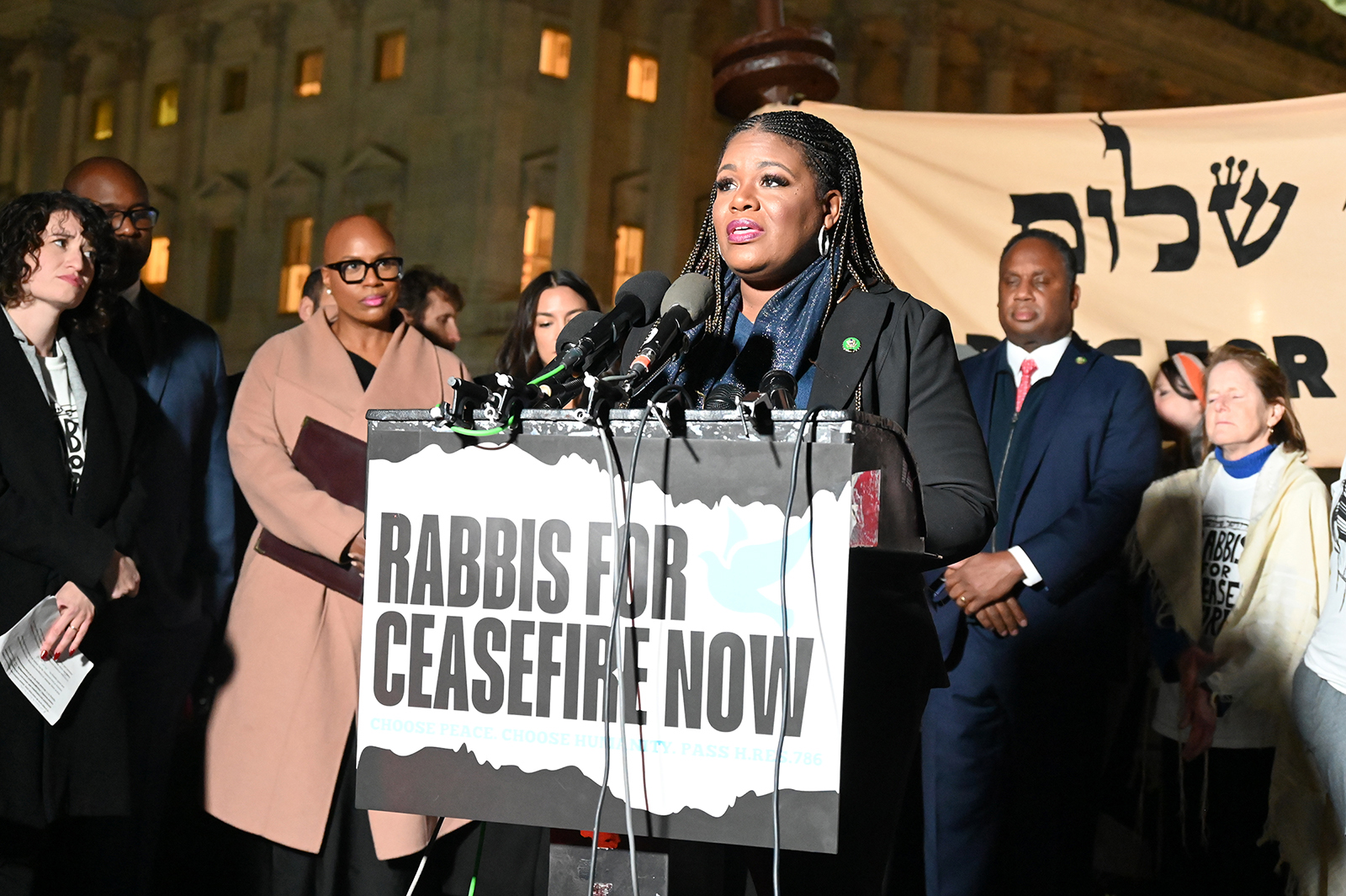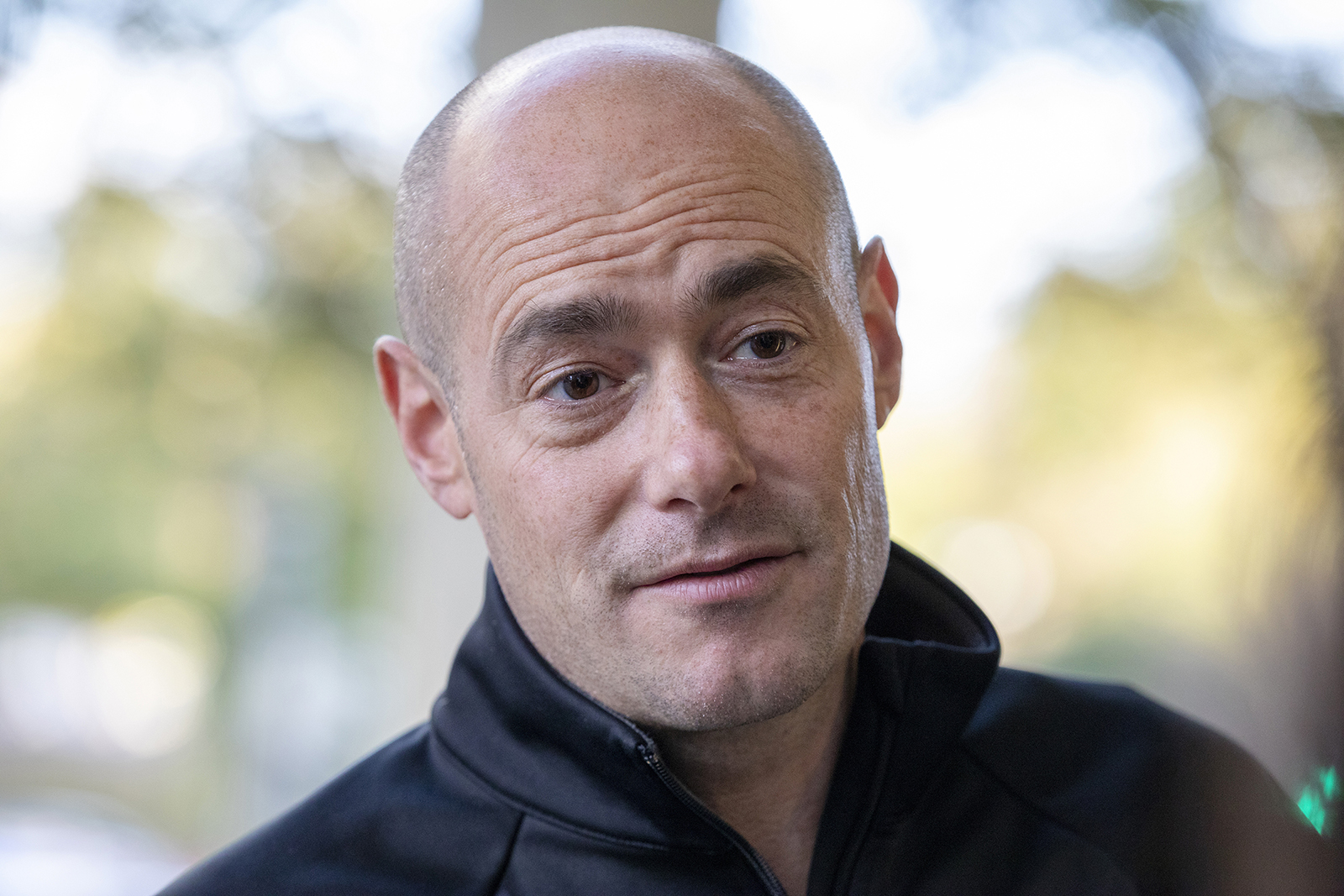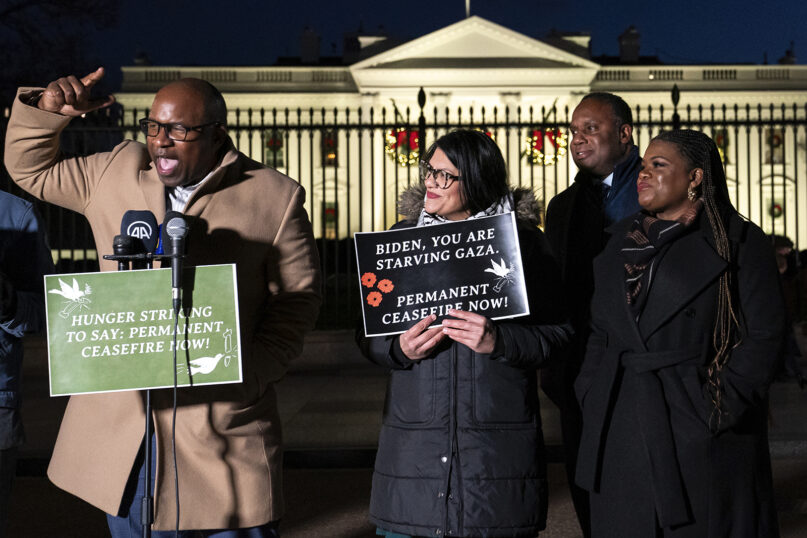WASHINGTON (RNS) — U.S. Rep. Greg Landsman doesn’t technically wear his faith on his sleeve, but he comes pretty close. On his shoulder, he sports a tattoo of his favorite passage from Scripture: “Do justice, love mercy, walk humbly with God,” it says in Hebrew, a quote from the biblical Book of Micah.
“God says very clearly, here’s what you should do,” said Landsman, pointing out that it is one of the few passages where God directly answers a question (“what does the Lord require of you?”) with an explicit directive.
Landsman, who studied economics and political science at The Ohio State University before attending Harvard Divinity School, said that as a member of Congress, “the degree in economics and a degree in theology have been the most useful.”
It has also been painful. The past few weeks, many members of Congress have been living on a knife’s edge, caught between their conscience and political calculation as they vote on what many see as the fate of Israel and the future of Palestinians.
Over the last two months, Landsman, a Jewish freshman congressman who represents a Cincinnati district with an influential Jewish vote, has faced what for him were tortuous votes on aid for Israel in its war against Hamas and the censure of a Democratic colleague for her pro-Palestinian rhetoric — votes that split Landsman’s loyalty to his ideals, to his party and to his relationships with other lawmakers.
Landsman was one of just 12 Democrats who backed the Israel aid package even though House Speaker Mike Johnson had attached a poison pill amendment draining funds from President Joe Biden’s retooling of the IRS to go after the very rich. After the vote, Landsman left the House floor in tears, furious at what he viewed as Johnson’s playing politics with Israel’s ability to fight the war, according to Semafor.
But drawing on his “foundational study” of the Torah, the Bible and the Quran, Landsman also raged that Johnson, a vocal evangelical Christian, had violated the teachings of Scripture.

U.S. Rep. Greg Landsman, D-Ohio, in Washington. (RNS photo/Jack Jenkins)
“Protecting billionaires? Not in the Bible,” Landsman, who once served as former Ohio Gov. Ted Strickland’s director of faith-based and community initiatives, said a few days after the vote.
Landsman’s yes vote, he told Religion News Service, was about “making sure that our allies have the resources they need to end this (war) as quickly as possible.”
A few days later, he joined the majority in a 234-188 vote in censuring Michigan Democrat Rashida Tlaib, the only Palestinian American in the House, for what they described as “calling for the destruction of the state of Israel” in her use of the slogan “From the river to the sea.” Just 23 other Democrats voted for the censure resolution.
Landsman said he cast his censure vote out of concern for the “survival of the state of Israel” because of how some extremists use the phrase that earned Tlaib her rebuke.
That vote weighs on him too. Landsman grew visibly emotional while discussing it with RNS, saying he had spent “a lot of time” with Tlaib having “incredibly emotional conversations” as “two human beings who are suffering and are hurting.” (Tlaib did not respond to requests for comment for this story.)
“Did I want to take that vote? No,” he said.
Landsman’s angst is a window into the tangle of religion, geopolitics and political pressure that Democratic lawmakers — be they progressives or moderates — have navigated since Hamas militants attacked communities in southern Israel on Oct. 7, leaving around 1,200 dead and hundreds kidnapped, as well as resulting in a subsequent Israeli assault into Gaza that has killed more than 15,000 and displaced more than a million. Activist groups and powerful lobbies have applied ample pressure to Democrats, but some say they have resorted to voting their conscience regardless of how it might hurt them politically — including imperiling their own reelection.
Many have cited the influence of powerful pro-Israel groups such as the American Israel Public Affairs Committee, known as AIPAC, which sponsored a trip to Israel with 24 Democrats last August, including a visit to a kibbutz on the Gaza border. The delegation boasted several freshmen from vulnerable districts — including Landsman, who beat Republican incumbent Steve Chabot by just a few points in November 2022.
In early October, before the Oct. 7 attack by Hamas, AIPAC featured Landsman in a nearly three-minute video praising the trip and talking about the risk of living so close to the border. A few weeks later, several other lawmakers from that trip joined Landsman in breaking ranks to vote for Israel aid and to censure Tlaib, and analysts were quick to note that most of them took AIPAC money during the 2022 election cycle.
But Landsman was one of the few who hadn’t taken AIPAC money in that cycle — in fact, the group had endorsed his opponent.
And his work on faith outreach for former Gov. Strickland means he is in touch with an array of religious communities in his home state. The morning of the censure resolution vote, he fielded calls from frustrated Arab American and Muslim American friends. These relationships, he said, are precisely what makes these votes so difficult.
“It’s been hard,” he said. A hobbyist boxer, Landsman sat for an interview in his office in front of a portrait of the heavyweight champion Muhammad Ali and noted that his divinity school roommates included a Muslim, a Southern Baptist and a Methodist.
Landsman took pains to note that he “led the charge” to condemn a bill introduced by GOP Rep. Ryan Zinke that would have expelled Palestinians from the U.S., introducing a formal resolution saying the bill “dangerously conflat(ed) Palestinians with Hamas and its actions.”
In what many observers call a war of Arab and Israeli nationalism, rather than a religious war, faith has played an unusually large role in American politicians’ reaction to the conflict. That’s no less true of Democrats’ progressive wing.

Rep. Cori Bush speaks at a news conference with Rabbis for Ceasefire in mid-November 2023. (RNS photo/Jack Jenkins)
On Nov. 13, at a Rabbis for Ceasefire news conference outside the U.S. Capitol, U.S. Rep. Cori Bush, who previously served as a Christian pastor, said: “We are rabbis. We are pastors. We are Congress members. We are surviving family members. We are human beings. And we are bound by our faith to demand a cease-fire now.”
U.S. Rep. Jamaal Bowman, who represents a swath of the New York City suburbs, told the gathering of a letter signed by more than two dozen rabbis urging a local Democrat, George Latimer, to run against him.
“In my district, 26 rabbis wrote a letter against me calling for a cease-fire,” Bowman told a news conference in mid-November. “I haven’t been able to stand with them or visit any synagogues in my district.”
Later in the month, Latimer visited Israel. On Monday evening, he filed to run against Bowman.
Once broadly supportive of Democrats, as a strong majority of Jewish voters are, AIPAC has increasingly become a scourge for liberals as Republicans, especially evangelicals such as Johnson, have rallied to Israel’s side. When Sen. Bernie Sanders, an independent who caucuses with the Democrats, ran for president in 2016, he declined to speak at AIPAC’s conference, traditionally a stop for White House hopefuls of either party.
But the group, which first began direct fundraising for candidates in 2021, was one of the top 20 spenders in the 2022 election cycle. Slate reported last month that AIPAC is expected to spend at least $100 million in Democratic primaries, particularly in efforts to unseat liberal lawmakers such as Tlaib and others who have called for a cease-fire in Gaza. AIPAC-funded attack ads have already begun running in Bowman’s district.
Even so, Bowman has stood by his positions last month, explaining that his support for a cease-fire in Gaza was “about humanity, period.” Bowman said that while he doesn’t know the Bible “that well,” at least one verse continues to guide him: “Three words from the Messiah himself: ‘Love thy neighbor,'” he said.
AIPAC has yet to endorse either Landsman or his Republican challenger, who announced his candidacy in July.

Rep.-elect Greg Landsman, D-Ohio, arrives for new member orientation check-in and program registration at the Hyatt Regency, in Washington, Nov. 13, 2022. (AP Photo/Amanda Andrade-Rhoades)
Meanwhile, Landsman has felt blowback in his district for his votes. In early December, protesters attempted to deface Landsman’s district office with a Barbie-themed poster that accused him of supporting “genocide” and “ethnic cleansing” in Gaza. They mistakenly posted it on the wrong building, but on social media Landsman condemned the placard as a “dangerous” effort that used “insidious language that makes us all less safe.”
Landsman also canceled a town hall a month earlier after the House sergeant-at-arms warned of “very serious national threats against Jews,” though activists claimed the cancellation was due to a planned cease-fire protest.
It’s a delicate dance in Landsman’s district, where even younger Jews show higher-than-average support for Israel — a rarity for a subgroup that has otherwise been disproportionately ambivalent about the country compared with older Jews. A 2019 study by Brandeis University found that 42% of Jewish young adults in Cincinnati aged 22 to 34 “feel more strongly connected to Israel than their corresponding age group on the national level,” compared with 23% nationally.
Landsman said that even if religion is being used to cleave Americans one from another now, he remains hopeful that faith communities can offer a productive way forward.
“Right now, people are hurting. They can offer some relief to that,” he said. “If people are confused, they can offer some clarity. People are longing for community. They can offer that.“
They can even offer forms of “productive advocacy,” he said, a seeming reference to religious groups that have staged demonstrations both supporting and decrying Israel’s actions. He may include the votes of lawmakers of faith like him.
“That is certainly better than a Twitter page,” he said.





